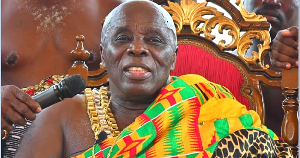 Okyenhene Osagyefuo Amoatia Ofori Panin
Okyenhene Osagyefuo Amoatia Ofori Panin
The Okyenhene, Osagyefuo Amoatia Ofori Panin, is tasking religious leaders to take an active role in environmental stewardship in the wake of the devastating effects of climate change on the global economy and its impact on human survival.
According to Osagyefuo, Ghana remains a religious nation, with the majority of its citizens deeply believing in either the Christian faith, Islam, or traditional beliefs.
He says one of the cardinal principles underpinning these religions centers on environmental stewardship, yet our actions often fall short of these teachings.
Delivering a public lecture organized by the Graduate Students Association at the University of Ghana under the theme "Transformational Leadership in Contemporary Ghana," the Okyenhene posited that transformational leaders are passionate, energetic, inspire, and create a sense of commitment and purpose among followers.
He indicated that religious leaders must endeavor to inspire their followers to follow the dictates of their religion when conserving the environment.
Osagyefuo said that in Christianity, the Bible emphasizes the importance of caring for creation.
He referenced the words in Genesis 2:15, which state, "The Lord God took the man and put him in the Garden of Eden to work it and take care of it."
He said this verse underscores Christians' duty to nurture and protect the environment.
The Okyenhene further cited the Quran in Surah Al-A'raf 7:31, which also highlights the principle of moderation and the avoidance of waste, which are essential for environmental sustainability.
Additionally, the Prophet Muhammad (PBUH) emphasized the importance of planting trees and preserving nature, stating, "If a Muslim plants a tree or sows seeds, and then a bird, a person, or an animal eats from it, it is regarded as a charitable gift (Sadaqah) for him." (Sahih Bukhari).
On his part, the Kwaebibiremhene said that in traditional beliefs, the Akan people hold the earth, known as Asaase Yaa, in high regard.
Traditional practices and taboos, such as the prohibition of farming on certain sacred days, reflect a deep respect for the environment and a commitment to its preservation.
Osagyefuo questioned whether Ghanaians are truly living up to their religious principles when it comes to environmental stewardship.
He noted that the evidence suggests that we have much room for improvement, adding that the earth's ability to support life is being severely compromised.
"Despite the strides made by transformational leaders, several challenges persist in Ghana's leadership landscape. One significant challenge is illegal mining, or 'galamsey,' which has devastated the environment and posed a threat to sustainable development."
"My own efforts to combat galamsey have been vigorous, including calling for an all-hands-on-deck approach, destooling chiefs involved in illegal mining, and supporting government initiatives to end the menace. However, the fight against galamsey remains ongoing, and more robust measures are needed to protect our environment and communities," the Okyenhene noted.
The Okyenhene continued to express concerns about the effectiveness of Ghana’s decentralization systems and whether the current local governance structures truly promote development at the grassroots.
He pointed out that the Local Governance Framework is intended to bring governance closer to the people, ensuring that local authorities are more responsive to the needs and aspirations of their communities.
However, the current practice often falls short of the constitutional mandates outlined in Articles 243(2)(b) and 251(1) of the 1992 Constitution.
"Article 243(2)(b) stipulates that the District Chief Executive (DCE) is responsible for the day-to-day performance of the executive and administrative functions of the District Assembly."
"Similarly, Article 251(1) establishes the Executive Committee of a District Assembly, which is charged with performing these functions. However, in practice, the DCE often assumes roles beyond these mandates, overshadowing the contributions of Assembly members who are members of the executive committee to whom these functions have been collectively given," noted the Okyenhene.